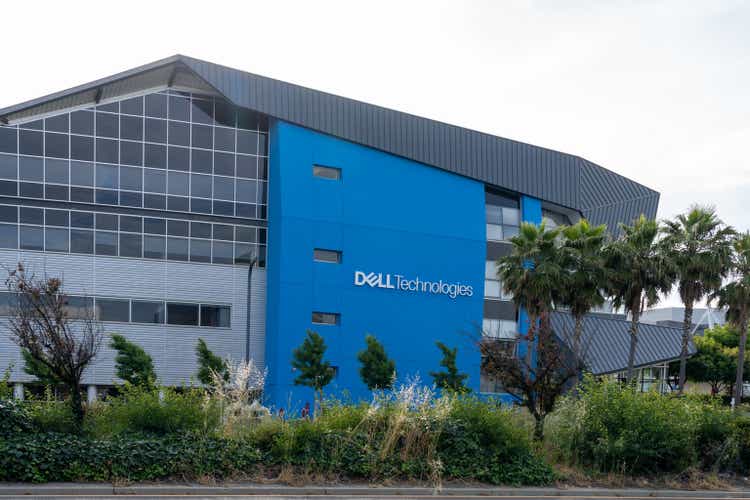
JHVEPhoto
Bernstein remains cautious about the potential for a long term inflection in storage growth, but it is positive about the potential for a near-term cyclical recovery in storage.
The firm rated Dell Technologies (NYSE:DELL) as Outperform, while Hewlett Packard Enterprise (NYSE:HPE) and IBM (NYSE:IBM), both, as Market Perform.
Dell: Analysts led by A.M. (Toni) Sacconaghi, Jr. noted that they remain positive on Dell due to the potential for near-term AI server upside. While Dell’s first quarter fiscal 2025 results (in May) disappointed relative to very high expectations, they continue to think that Dell’s near term AI server revenues could significantly exceed expectations.
The analysts added that while these revenues are likely to come at lower margins, capping EPS upside, they believe any improvement in overall Infrastructure Solutions Group, or ISG, profitability near-term (which could benefit from improving storage margins) will likely assuage fears.
While the analysts see risk in the medium term from a digestion in AI infrastructure, they added that the stock has retreated materially from its recent highs, and could rebound among any positive AI data points. They rate Dell Outperform, with a price target of $155.
HPE: Sacconaghi Jr. and his team continue to be cautious about HPE’s acquisition of Juniper, and rate the stock Market-Perform. While HPE could also see continued revenue upside this year from strong AI server shipments, the opinion seems to be divided on whether HPE can be a sustained AI beneficiary beyond FY24, especially with backlog already drawing down in fiscal second quarter.
In addition, the analysts are concerned that the company could be inwardly focused for the next one-to-two or more years preparing for and integrating its Juniper acquisition, risking share loss in its traditional businesses. They have rated HPE MarketPerform with a $19 price target.
IBM: The analysts see risk-reward on IBM as relatively neutral. They said IBM is executing well, its growth rate has improved, the company has high levels of recurring revenues and profitability, and pays a steady 3.5% dividend.
However, the stock has re-rated, and they think it is relatively fairly valued. This appears relatively fair versus comparables like Cisco Systems (CSCO), Oracle (ORCL) and others, given that IBM’s organic revenue growth rate is currently around 2%, according to the analysts.
The analysts see the set-up for IBM looking into FY’25 as favorable, as revenues should benefit from acquisitions, a new mainframe cycle and potentially an ELA cycle. The firm has set a $185 price target on IBM’s stock.
Thoughts on storage market:
Sacconaghi Jr. and his team noted that the storage businesses of Dell and HPE remain important to the stocks, accounting for an estimated 30% of Dell’s operating profit and close to 20% of HPE’s historically. That said, the on premise external storage market is a cyclical business, with essentially no growth over the last decade, and captive storage vendors (Dell, HPE and IBM) have lost share.
However, the analysts added that, beyond end market exposure and China, Bernstein’s analysis suggests that Dell, HPE and IBM have still lost share in like for like end markets. The analysts believe the main reasons for share losses are — limited success in selling outside their existing customer bases; lagging technology innovation; and platform complexity.
On the positive side, Sacconaghi Jr. and team noted that, HPE and Dell have been active participants in and beneficiaries of the growth of hyperconverged infrastructure, or HCI. However, HCI is generally margin dilutive due to lack of software content, which presents Dell with a strategic dilemma — while HCI is accretive to growth, it continues to pressure operating margins.
Dell’s storage profitability is now materially lower than EMC’s margins as an independent company, which they attribute to the growth and mix shift towards HCI along with a shift away from high-end storage, increased investments and competitive dynamics, the analysts stated.
In addition, the analysts suspect Dell’s HCI revenue could slow after officially ending its perpetual license distribution agreement with VMware. Dell is attempting to shift customers to its PowerFlex offering.
Storage has been a vital focus area for both Dell and HPE, with mixed results, and several refreshed product offerings, go to market changes and acquisitions over the last several years have not led to a structural change in the businesses’ growth profile. For IBM, storage no longer appears to be a strategic priority, according to the analysts.
Dell has a Strong Buy rating at Seeking Alpha’s Quant Rating system, which consistently beats the market. Meanwhile, the Seeking Alpha authors’ average rating is Buy, and so is the average Wall Street analysts’ rating, Buy.
